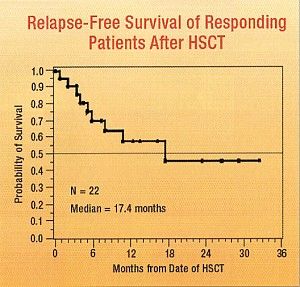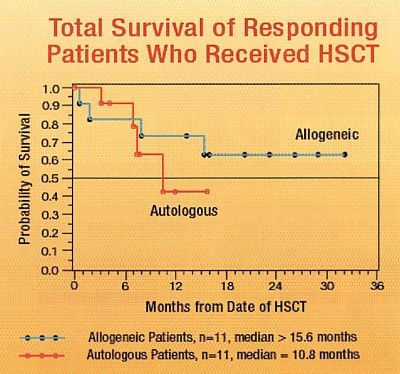Pretransplant Mylotarg Boosts Survival in Relapsed AML
SAN FRANCISCO-Patients with acute myeloid leukemia (AML) in first relapse who achieve remission with the antibody gemtuzumab ozogamicin (Mylotarg) before undergoing stem cell transplantation have prolonged disease-free survival, according to research presented at the 42nd Annual Meeting of the American Society of Hematology (ASH).
SAN FRANCISCOPatients with acute myeloid leukemia (AML) in first relapse who achieve remission with the antibody gemtuzumab ozogamicin (Mylotarg) before undergoing stem cell transplantation have prolonged disease-free survival, according to research presented at the 42nd Annual Meeting of the American Society of Hematology (ASH).

Figure 1 shows relapse-free survival of patients with acute myeloid leukemia in first relapse who achieved remission with gemtuzumab ozogamicin (Mylotarg) before undergoing hematopoietic stem cell transplantation (HSCT).
Early data from clinical studies conducted at Fred Hutchinson Cancer Research Center and other centers suggest that patients who respond to pretransplant therapy with gemtuzumab can receive curative therapy in the form of hematopoietic stem cell transplantation.
"Mylotarg is a drug that enables patients to receive definitive therapy," said Eric Sievers, MD, assistant professor of pediatrics, University of Washington, and assistant member, Fred Hutchinson Cancer Research Center.
Gemtuzumab is a humanized anti-CD33 antibody linked to calicheamicin, a potent antitumor antibiotic. It is FDA approved for the treatment of CD33-positive AML in patients age 60 and older who are in first relapse and are poor candidates for cytotoxic therapy. Expression of CD33 is restricted to hematopoietic cells and absent from pluripotent stem cells.
The study included 22 patients with AML in first relapse who achieved remissions with gemtuzumab administered as a single agent and then underwent hematopoietic stem cell transplantation: 11 allogeneic and 11 autologous.
A majority of patients were alive without leukemia 1 year after the transplant (see Figure 1). At the time of data cutoff, the median relapse-free survival for the 22 patients was 17.4 months.
One-year survival of responding patients was highest for those who received allogeneic stem cell transplants (60%), compared with a 40% survival rate for autologous transplant patients (Figure 2).

Figure 2 shows overall survival for the Mylotarg responders who received allogeneic vs autologous stem cell transplant. Figures courtesy of Dr. Eric Sievers, of the University of Washington and Fred Hutchinson.
"Of 188 AML patients enrolled in the pivotal phase II trials of Mylotarg, 58 responded to Mylotarg treatment but only 22 received subsequent hematopoietic stem cell transplantation, perhaps because of concerns regarding the intensity of the treatment," Dr. Sievers told ONI. "Our data support the overall safety and efficacy of hematopoietic stem cell transplantation for patients who achieve second remissions with Mylotarg."
Gemtuzumab offers patients a "reasonably deep remission" that is sufficient to deliver patients to successful transplantation, he said.
The incidence of fatal hepatic veno-occlusive disease in these patients was reasonably low. One of the 22 responding transplant patients (5%) succumbed to veno-occlusive disease, as did 2 of 13 (15%) nonresponding patients who underwent transplantation in refractory first relapse.
"This study shows that patients with relapsed AML can be safely salvaged with a combined Mylotarg-transplant approach," Dr. Sievers concluded.
Navigating AE Management for Cellular Therapy Across Hematologic Cancers
A panel of clinical pharmacists discussed strategies for mitigating toxicities across different multiple myeloma, lymphoma, and leukemia populations.